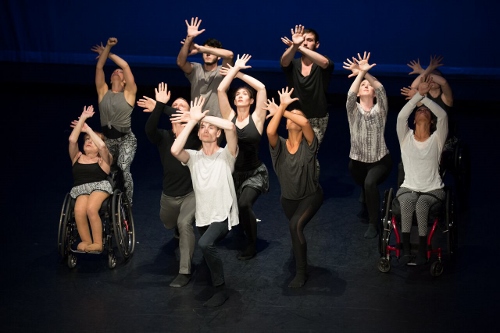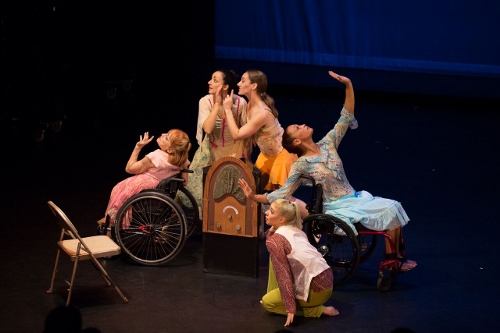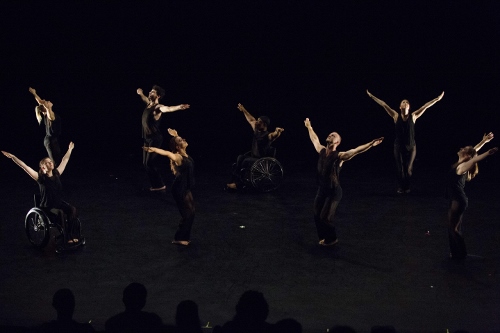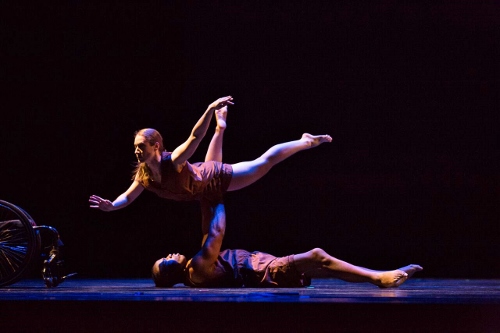|
 |
|
|
 |
 |
Mary Verdi-Fletcher was born with spina bifida, but dreamed about becoming a professional dancer. Against all odds, her single-minded determination turned her dream into reality, and she created Dancing Wheels Company in 1980 in Cleveland, Ohio, a company of first-rate trained dancers with and without disabilities. Now commemorating 37 years as the nation’s first and foremost physically integrated dance company, the 14-member ensemble made a recent stopover in New York, on October 7, to showcase a remarkable program entitled Past, Present, Future of Integrated Dance, which included both repertory works and world premieres. “Above” (1991), choreographed by Daniel Job, with music by Samuel Barber, is one of the company’s most beloved works, as it was Verdi-Fletcher’s debut performance out of her wheelchair. She was placed on the floor and moved her arms, her only viable limbs, in the most graceful ways, while three dancers performed their deft movements. A male dancer lifted her up high and carried through space. He also placed her in various positions on his body. It was a lovely, elegant work. Then there was a clip from the astonishing 2011 documentary film, “Lives Worth Living,” directed by Eric Neudel, which highlighted the “Capitol Crawl,” an act of civil disobedience, in which disabled rights activists courageously crawled up the 365 steps of the steep metal staircase. This and other bold actions culminated in the passage of the Americans with Disabilities Act (ADA) by Congress, signed by President George H.W. Bush on July 26, 1990. The film segued into “Clamor” (2015), choreographed by Sarah Swenson, with original music by Alessandro Girasoli, which was dedicated to the memory of Kenneth Irving Zola, an early disability rights activist, who participated in the “Capitol Crawl.” The dancers wriggled and slithered onstage, including three who are wheelchair-bound, which we didn’t know at the time until they were helped onto their vehicles. There was the sound of glass shattering into many pieces. “The Politico” (Matthew Robinson), dressed in a suit, red tie and wearing a phony smile, gesticulated and mouthed empty words. There were bells and other heavy sounds. Some dancers temporarily left the stage on their butts. Four in wheelchairs spun like tops. There was a powerful group dance, featuring arms pumping up and down. At the end, the group moved downstage and shouted determinedly about disabled rights. Verdi-Fletcher as “The Individual” was a quiet presence, but she meant business. “Sweet Radio Radicals” (2008) by dance icon Dianne McIntyre was a charming, crowd-pleasing seven-parter, billed as “a musical travelogue where turns of a radio dial set into motion female dancers who embody the emotions reflected in music [by female singers] from the last century,” There were five female dancers, two in wheelchairs, who performed in the various pieces. Each song/dance was a gem. Joplin’s goofy “Mercedes Benz” had a trio walking on their knees, praying for a Mercedes Benz and a color TV. Canadian First Nation Buffy Sainte-Marie’s “Universal Soldier” (1963) had me in tears recalling the era in which she wrote, which still resonates today. The premiere of “Neither Lost Nor Found, by James Morrow is based on the oft-quoted, “First they came for me….” by German Lutheran pastor Martin Niemöller (1892-1984), which has engendered many variations to suit the circumstances. In this case the original quote was replaced with not speaking out for indigenous people, people of color, the LGBTQ community and women. It’s an 11-member piece beautifully illustrating the company’s fully integrated dance mission. Three people in wheelchairs provided their laps for dancers, as they spun them around in circular shapes. The standing dancers and those in wheelchairs shared well-coordinated, fluid hands and arms movements. I don’t know Heidi Latsky’s “Interlude” (2014), which she originally choreographed for her dance company, but her restaging a year later for Dancing Wheels Company, couldn’t have been any finer or better performed. It began without music on a dark stage, then jumps, fast movements, then quiet and slow. There were solo dance breakouts, changing and holding poses. “Somewhere Over the Rainbow” sung by Judy Garland provided the mood. Dancing Wheels' resident choreographer Catherine Meredith’s “Incommunicado” (2015) was inspired by Title IV of ADA: Telecommunications that ensure functionally equivalent services for consumers with disabilities. Using sign language (there was a woman signing) as a basis for movement, the work explores what can occur if there is a breakdown in communication. The music by Global Communication was lively, with a repetitious beat that drove the dancing. The standout performance was by Demarco Sleeper, who is in a wheelchair. He performed a breathtaking duet out of his wheelchair. His partner Sara Lawrence-Sucato lay on top of him, his muscular arms lifting her up high, in addition to other physical intimacies. The world-premiere of "Imagine, If you will…" by David Dorfman, in collaboration with the company, featured the dancers in a circle, with arms raised. Later clusters, clutching onto one another, a struggle, in a line, pairings, vocalizations, arms crossed, head bowed, not bowed. Strong, united, inspired. Dancing Wheels Company will premiere a version of Past, Present, Future of Integrated Dance at 7:30 p.m. on Saturday, November 4, 2017 at The Breen Center for the Performing Arts at Saint Ignatius High School, 2008 W. 30th Street, Cleveland. Tickets are $20 general, $15 for students/seniors. Tickets can be purchased in advance at www.dancingwheels.org or by calling (216) 432-0306.
 Dancing Wheels dancers in Catherine Meredith's "Incommunicado" (2015). Photo © & courtesy of Scott Shaw |
|
 Dancing Wheels dancers in James Morrow's "Neither Lost Nor Found." Photo © & courtesy of Scott Shaw |
|
 Dancing Wheels dancers in Dianne McIntyre's "Sweet Radio Radicals" (2008). Photo © & courtesy of Scott Shaw |
|
 Interlude Photo © & courtesy of Scott Shaw |
|
 Dance Wheels dancers Demarco Sleeper and Sara Lawrence-Sucato in Catherine Meredith's "Incommunicado" (2015). Photo © & courtesy of Dancing Wheels |
|
 Dancing Wheels dancers in Daniel Job's "Above" (1991). Photo © & courtesy of Scott Shaw |
|
 Dancing Wheels dancers in David Dorfman's "Imagine, If you will…" Photo © & courtesy of Scott Shaw |
|
|
|








